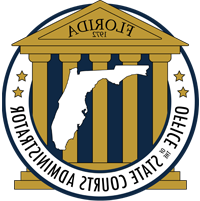Supreme Court of Florida
The highest appellate court in Florida, the Florida Supreme Court’s 170+ years span a time when the state was the least populated (1845) to the present when it ranks third nationwide. Decisions stemming from Florida’s highest court have helped shape, certainly, the state itself, and the nation as well.
Visit the Florida Supreme Court website:
Organization
The Florida Supreme Court is composed of seven Justices. At least five Justices must participate in every case and at least four must agree for a decision to be reached. The Court's official headquarters is the Supreme Court Building in Tallahassee.
To be eligible for the office of Justice, a person must be a registered voter who resides in Florida and must have been admitted to the practice of law in Florida for the preceding 10 years.
Jurisdiction
The jurisdiction of the Supreme Court is set out in the Constitution with some degree of flexibility by which the Legislature may add or take away certain categories of cases.
Mandatory Jurisdiction: The Court MUST review
- final orders imposing death sentences,
- district court decisions declaring a State statute or provision of the State Constitution invalid,
- bond validations,
- certain orders of the Public Service Commission on utility rates and services.
“Mandatory” jurisdiction defines those cases that, under the constitutional and statutory framework of a state, must be considered and decided by the court as a matter of right if properly filed.
Discretionary Jurisdiction: The Court, in addition to these forms of mandatory review authority, if discretionary review is sought by a party, the Court at its discretion MAY review
- any decision of a district court of appeal that expressly declares valid a state statute,
- construes a provision of the state or federal constitution,
- affects a class of constitutional or state officers,
- directly conflicts with a decision of another district court or of the Supreme Court on the same question of law,
- certified as great public importance,
- certified direct conflict,
- certified judgment of trial courts,
- certified question from federal courts.
“Discretionary” jurisdiction defines the class of cases where a petition seeking review, if granted, would result in the case being considered and decided on the merits.
For more information about jurisdiction of the Florida Supreme Court, visit the Florida Supreme Court web site.
